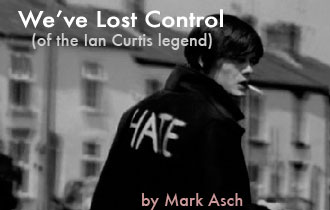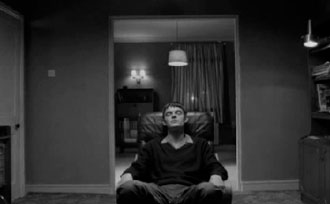We’ve Lost Control (of the Ian Curtis Legend)
10.10.07
 I will say this: Unknown Pleasures was the second CD I owned, having been improbably drawn in by only the bandname and cover. I feel fortunate to have experienced the urgency, foreboding and perfection of this album… having never seen the name “Ian Curtis” outside of the liners. All I knew was that his alienation seemed impossibly close and more earnest than any music I had ever heard. And, I––yeah, like so many others––felt I could relate.
I will say this: Unknown Pleasures was the second CD I owned, having been improbably drawn in by only the bandname and cover. I feel fortunate to have experienced the urgency, foreboding and perfection of this album… having never seen the name “Ian Curtis” outside of the liners. All I knew was that his alienation seemed impossibly close and more earnest than any music I had ever heard. And, I––yeah, like so many others––felt I could relate.
-Eric Carr, pitchforkmedia.com
When, in his powders-and-pills collage of a Manchester valentine 24 Hour Party People, Michael Winterbottom wanted to memorialize Joy Division frontman Ian Curtis, he inserted the video for the band’s “Atmosphere,” made in 1988, eight years after Curtis’s suicide at age 23.
The solemn tone of the video’s black and white photography suggests the dirgelike pull of the song, and permits the almost Bergmanesque frankness of the symbolism. The atmosphere is heavy with moral absolutes, with the polar opposition of darkness and light that characterizes Joy Division’s elemental post-punk, and the looming presence of Curtis.
The video was made by Anton Corbijn, a Dutch photographer who had known and documented the band in the late 70s; Corbijn has now directed Control, a feature film treatment of Curtis’s life, drawn heavily from Touching from a Distance, the memoir of his widow Deborah.(The screenplay is by Brit TV scribe Matt Greenhalgh.) It’s shot by Martin Ruhe in black and whites redolent of Joy Division’s stark legacy, but is in all other ways lacking in the expressive leaps that characterize Corbijn’s “Atmosphere” video, and his other photographs of the band. Filmed in and around many of the Manchester-vicinity locations where Curtis lived, Control attempts to bring Curtis out from the long shadow of his own myth — to reveal the man behind the music. The problem with this approach is that it’s nearly impossible to think of a subject for whom this behind-the-music treatment is less germane.
 It must, of course, be hard to be Deborah Curtis: your Unknown Pleasures t-shirt is the man she married as a teenager and the father of her daughter. (The title of her memoir comes from a lyric in her husband’s song “Transmission.”) In a recent interview with Dennis Lim of the New York Times, Curtis allowed that, watching certain scenes, she “felt emotional, not for me, but for the characters in the movie. It really was like watching someone else. And in that way I suppose it was a kind of release.”
It must, of course, be hard to be Deborah Curtis: your Unknown Pleasures t-shirt is the man she married as a teenager and the father of her daughter. (The title of her memoir comes from a lyric in her husband’s song “Transmission.”) In a recent interview with Dennis Lim of the New York Times, Curtis allowed that, watching certain scenes, she “felt emotional, not for me, but for the characters in the movie. It really was like watching someone else. And in that way I suppose it was a kind of release.”
Not to begrudge her catharsis, but a film that humanizes Ian Curtis, as Control avowedly intends to do, stands in fundamental opposition to the nature of his art. The film focuses on the Curtis marriage, with Ian (Sam Reilly) balking at the crushing bust-town domesticity of his marriage to Deborah (Samantha Morton), and carrying out a guilt-laden affair with Belgian fan/journalist Annik de Honoré (Alexandria Maria Lara). This anything-but-bizarre love triangle, more than the arc of Curtis’s musical career, gives the movie its shape.
But Curtis has always been most compelling as an enigma. His art, in a sense, was refusal (his suicide came on the eve of the band’s first U.S. tour), his presence a denial of exchange with his audience:
In this early television appearance, Curtis looks, in the midst of his uniquely spastic dance moves, like he’s having fun. But every time the broadcast cuts to a close-up, his face is completely blank. If the role of a lead singer is to assume a sexual, psychological, or political position, embodying the slant of the song, Curtis — expressionless, his eyes hooded — withholds all clues. (In Control, meanwhile, a young Curtis is seen shirtless in front of his bedroom mirror, practicing his dance moves to Bowie’s “The Jean Genie.”) That Curtis could seemingly feel so much, so deeply, while remaining so impassive, is key to his enduring appeal: he’s a vast blank canvas, eternally relatable and projectable.
 Of course, any knowledge of Curtis’s biography informs the sense of high emotional stakes in his music. Melody Maker’s review of Unknown Pleasures opened with a quote from Raoul Vaneigem: “’To talk of life today is like talking of rope in the house of a hanged man.’” This was ten months before Ian Curtis hanged himself in his kitchen. And Control, in fact, subscribes to the standard cinematic understanding of how experience is transformed into art. The desperation in Curtis’s lyrics, it suggests, can be traced to his struggles with romance, and with epilepsy. In one scene, Curtis learns of a fellow epileptic’s death during a seizure. Curtis goes to his notebook; close-up on the page as he writes “She Lost Control”; the pencil hovers over the paper; wait for it, wait for it — is this the best we can do? Can it really be that the difference between biographical incident and finished creative product is simply the matter of a possessive apostrophe? Control also suggests that Curtis’s stage presence was informed by his epilepsy, the editing going jagged as his flailing dance moves bleed into an onstage grand mal. But Curtis, despite his turmoil, was always, well, in control.
Of course, any knowledge of Curtis’s biography informs the sense of high emotional stakes in his music. Melody Maker’s review of Unknown Pleasures opened with a quote from Raoul Vaneigem: “’To talk of life today is like talking of rope in the house of a hanged man.’” This was ten months before Ian Curtis hanged himself in his kitchen. And Control, in fact, subscribes to the standard cinematic understanding of how experience is transformed into art. The desperation in Curtis’s lyrics, it suggests, can be traced to his struggles with romance, and with epilepsy. In one scene, Curtis learns of a fellow epileptic’s death during a seizure. Curtis goes to his notebook; close-up on the page as he writes “She Lost Control”; the pencil hovers over the paper; wait for it, wait for it — is this the best we can do? Can it really be that the difference between biographical incident and finished creative product is simply the matter of a possessive apostrophe? Control also suggests that Curtis’s stage presence was informed by his epilepsy, the editing going jagged as his flailing dance moves bleed into an onstage grand mal. But Curtis, despite his turmoil, was always, well, in control.
In this performance of “Transmission” (a crucial BBC gig mimicked, very well, by Reilly during one of the film’s unforgivably few start-to-finish songs), Curtis’s movements are tight and tense, mechanical — an actual transmission. He’s not himself, he’s the song.
Corbijn, despite his previous experience articulating the metaphoric intensity of Curtis’s songs, adheres to a conventional portrait-of-the-artist storytelling structure with an emphasis on life behind the curtain, and the resulting picture is disappointingly literal: Ian Curtis tells his wife he no longer loves her; he writes “Love Will Tear Us Apart.” The response from those who knew Curtis — from Deborah Curtis (credited as a Co-Producer), from his surviving bandmates — has been quite positive. Control privileges a personal understanding of Curtis, and perhaps it’s a relief for them to have their intimate knowledge of the man reaffirmed. But for a vast majority, Curtis is an icon, and his status as such is ill-served by a treatment of his life barely distinct from the de rigueur music biopic stories of humble origins, addictions, and dressing-room meltdowns. Attempting to restore Curtis’s humanity, Control has robbed him of his singularity.